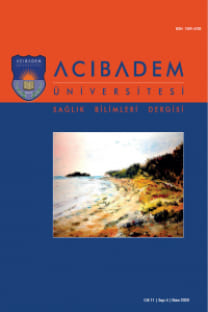Covid-19: ERCP’de Karşılaşılan Zorluklar Hakkında Bir Rerospektif Çalışma
Covid-19: A Retrospective Study About The Challenges for ERCP
___
- 1. Zimmon, D. S. (1975). The clinical value of endoscopic retrograde cholangiopancreatography. Bulletin of the New York Academy of Medicine, 51(4), 472.
- 2. Albert, J. G., & Riemann, J. F. (2002). ERCP and MRCP–when and why. Best Practice & Research Clinical Gastroenterology, 16(3), 399-41
- 3. Ahmed, M., Kanotra, R., Savani, G. T., Kotadiya, F., Patel, N., Tareen, S. et al. (2017). Utilization trends in inpatient endoscopic retrograde cholangiopancreatography (ERCP): a cross-sectional US experience. Endoscopy International Open, 5(04), E261-E271.
- 4. Chandrasekhara, V., Khashab, M. A., Muthusamy, V. R., Acosta, R. D., Agrawal, D., Bruining, D. H., & DeWitt, J. M. (2017). Adverse events associated with ERCP. Gastrointestinal endoscopy, 85(1), 32-47.
- 5. Cotton P. B. (1977). ERCP. Gut, 18(4), 316–341. https://doi. org/10.1136/gut.18.4.316
- 6. Cotton, P. B. (2001). ERCP is most dangerous for people who need it least. Gastrointestinal endoscopy, 54(4), 535-536. https://doi. org/10.1067/mge.2001.118446
- 7. Loperfido, S., Angelini, G., Benedetti, G., Chilovi, F., Costan, F., De Berardinis, F. et al. (1998). Major early complications from diagnostic and therapeutic ERCP: a prospective multicenter study. Gastrointestinal endoscopy, 48(1), 1-10.
- 8. Anderson, M. A., Fisher, L., Jain, R., Evans, J. A., Appalaneni, V., Ben- Menachem, T. et al.. (2012). Complications of ERCP. Gastrointestinal endoscopy, 75(3), 467-473.
- 9. Soetikno, R., Teoh, A. Y., Kaltenbach, T., Lau, J. Y., Asokkumar, R., Cabral-Prodigalidad, P. et al. (2020). Considerations in performing endoscopy during the COVID-19 pandemic. Gastrointestinal endoscopy, 92(1), 176-183.
- 10. Resál, T., Bor, R., Szántó, K., Fábián, A., Rutka, M., Sacco, M. et al. (2021). Effect of COVID-19 pandemic on the workflow of endoscopy units: an international survey. Therapeutic advances in gastroenterology, 14, 17562848211006678. https://doi.org/10.1177/17562848211006678
- 11. Tag-Adeen M, Yousef M, Osman H, et al. Impact of COVID-19 pandemic on endoscopic retrograde cholangiopancreatography; a single center experience (published online ahead of print, 2021 Oct 26). Rev Esp Enferm Dig. 2021;10.17235/reed.2021.8229/2021. doi:10.17235/reed.2021.8229/2021
- 12. John O’Grady, Jan Leyden, Padraic MacMathuna, Stephen Stewart & T. Barry Kelleher (2020) ERCP and SARS-COV-2: an urgent procedure that should be immune, Scandinavian Journal of Gastroenterology, 55:8, 976-978, DOI: 10.1080/00365521.2020.1789210
- 13. Voiosu, T., Voiosu, A., Boškoski, I., Arvanitakis, M., Bronswijk, M., Hollenbach, M. et al. (2020). Technical and clinical outcomes of endoscopic retrograde cholangiopancreatography (ERCP) procedures performed in patients with COVID-19. Therapeutic advances in gastroenterology, 13, 1756284820980671. https://doi. org/10.1177/1756284820980671
- 14. Søreide, K., Hallet, J., Matthews, J. B., Schnitzbauer, A. A., Line, P. D., Lai, P. et al. (2020). Immediate and long-term impact of the COVID-19 pandemic on delivery of surgical services. The British journal of surgery, 107(10), 1250–1261. https://doi.org/10.1002/bjs.11670
- 15. Layton, G. R., Chung,W.Y., Isherwood, J., Fraser, R. E., Issa, E., Robertson, G. S. et al. (2021). Endoscopic retrograde cholangiopancreatography in the COVID era: considerations for hepatobiliary and pancreatic surgery units. The British journal of surgery, 108(9), e290–e291. https://doi.org/10.1093/bjs/znab161
- 16. Lauro A, Pagano N, Impellizzeri G, Cervellera M, Tonini V. Emergency Endoscopy During the SARS-CoV-2 Pandemic in the North of Italy: Experience from St. Orsola University Hospital-Bologna. Dig Dis Sci. 2020;65:1559–1561
- 17. Repici A, Pace F, Gabbiadini R, Colombo M, Hassan C, Dinelli M ITALIAN GI-COVID19 Working Group. Endoscopy Units and the Coronavirus Disease 2019 Outbreak: A Multicenter Experience From Italy. Gastroenterology. 2020;159:363–366.e3.
- 18. Kim KH, Kim SB. Comparison of the impact of endoscopic retrograde cholangiopancreatography between pre-COVID-19 and current COVID-19 outbreaks in South Korea: Retrospective survey. World J Clin Cases. 2021;9(28):8404-8412. doi:10.12998/wjcc.v9.i28.8404
- 19. Donato, G., Forti, E., Mutignani, M., Laterra, M. A., Arese, D. et al. 2021). A multicenter survey on endoscopic retrograde cholangiopancreatography during the COVID-19 pandemic in northern and central Italy. Endoscopy international open, 9(4), E629–E634. https://doi.org/10.1055/a-1380-3419
- 20. Kim KH, Kim SB, Kim TN. Changes in endoscopic patterns before and during COVID-19 outbreak: Experience at a single tertiary center in Korean. World J Clin Cases. 2021;9(15):3576-3585. doi:10.12998/ wjcc.v9.i15.3576
- ISSN: 1309-470X
- Yayın Aralığı: 4
- Başlangıç: 2010
- Yayıncı: ACIBADEM MEHMET ALİ AYDINLAR ÜNİVERSİTESİ
C Vitamini Desteğinin Diabetes Mellitus ile İlişkili Metabolik Anormallikler Üzerindeki Etkileri
Taha Gökmen ÜLGER, Funda Pınar ÇAKIROĞLU
Selma DURMUŞ SARIKAHYA, Emel GÜDEN, İsmet ÇELEBİ
Bahadır TURAN, Mahmut ALMBAİDHEEN
Hipoksik-İskemik Beyin Hasarında Kötü Prognozun Elektroenseflaogram ve Nöro-görüntüleme Belirteçleri
Mustafa Emir TAVŞANLI, Mustafa SEÇKİN
İbrahim Alper YAVUZ, Cahit KOÇAK, Fatih İNCİ, Erman CEYHAN, Ahmet Özgür YILDIRIM, Özdamar Fuad ÖKEN
Saniye SÖZLÜ, Bülent ELBASAN, Efsun KARABUDAK
Cem GÜN, Süha TÜRKMEN, Hasan ALDİNÇ, Orhan ÇINAR, Serpil YAYLACI, Gürdal YILMAZ
Şura KAYA, Ayşe DOST, Selma BAZ
Halk Sağlığı Laboratuvarında Test İstem Sonuç Süre Aralıklarına Pandeminin Etkisi
Murat CİHAN, Muhammed Fevzi KILINÇKAYA
Kişisel Yüz maskesi kullanımının İşitme Hassasiyetine Etkisi
